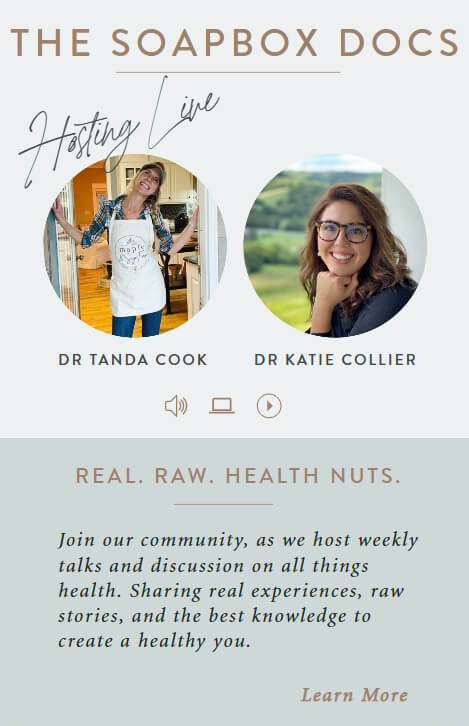By now I’m sure you’ve read a million articles about inflammation and what you should or shouldn’t be eating in order to stop it in its tracks.
Yet, WHAT you are eating is only one piece of the inflammation puzzle.
When coaching patients around food I talk about the who, where, when, and why of eating as much as I talk about what they are eating.
It’s true that food is medicine and can be a powerful contributor to either health or disease depending on the foods you are regularly consuming. There’s no doubt that all food is not created equal, and that 100 calories from Cheetos differs drastically in nutrient density than 100 calories of carrots. They both are orange, but the similarities end there.
I’m sure you’ve all heard the saying “you are what you eat.” But the reality is that you aren’t what you eat, you’re what you absorb. A poorly functioning digestive tract leads to poor absorption leads to poor health.
Think about the brain and digestive tract not as two separate systems, but as one super system that functions together. The gut is often referred to as the second brain because a large percentage of neurotransmitters are made there. It’s also regulated by a complex neural network that both influences and is influenced by your mood and stress levels.
Stress is kind of a catch all term for physiological and biological changes that occur in the body in response to some real or perceived threat. It comes in many forms, from the food you eat, the environment you live in, the thoughts you think, to the situations you find yourself in. Regardless of what the stressor is, the result is altered hormone secretion and expression which impacts every bodily system.
Elevated stress leads to changes in gut motility, gastrointestinal secretion, intestinal permeability, the microbiome, and the ability to regenerate the lining of the GI tract. An inflamed GI tract can ultimately lead to systemic, chronic inflammation through the complex relationship of the gut, the immune system, and the brain.
In other words, chronic stress = chronic inflammation.
This is why simply focusing on what you are eating and ignoring the other “W” questions will rarely get you the results you crave. Exploring why you eat, with whom you eat, when you eat, and where you eat can help you to identify hidden stressors you didn’t know were there and ultimately help you to quell inflammation and begin to feel better in your body.
1. Who
Think about some of your best memories around food and my guess is you’ll land on a memory where the food was good, and the company was better because food really is community.
We congregate around food in celebration, in mourning, and everything in between. It’s an opportunity to connect, talk about our day, and to know one another more deeply.
Conversations around the dinner table are some of my most cherished moments in life, and I hold it as a sacred space.
I encourage you to be intentional with the people you surround yourself with when you eat.
It can be a friend, a coworker, family, or a neighbor, but as often as you can choose people who you feel safe with to share enriching conversation, and lots of laughter.
2. What
Food is information. Your body breaks down the carbohydrates, fats, and proteins into smaller building blocks in order to build you. It’s an opportunity to provide your body with what it needs to best support your health and keep you well.
Food is not inherently good or bad. A Cheeto is not bad, but it does provide you with different information than a carrot. This doesn’t mean you can never eat a Cheeto again but being intentional with the information you are giving your body regularly will certainly lead to better health outcomes and overall better quality of life.
Focus on whole foods, shop on the perimeter of the grocery store or at your local farmer’s market. Increase your vegetable intake and buy meat from farmer’s who care.
Enjoy the birthday cake, and your favorite foods with a happy heart.
3. Where
Where you eat contributes greatly to the efficacy of our digestion and the ability to regulate hunger and fullness.
Digestion begins with awareness that you are hungry and through smell. Before the food ever enters your mouth, the smell has triggered a cascade of events leading to increased saliva and oral enzymes as well as increased stomach acid. This cascade primes the body for food and stimulates digestion.
Cooking food at home where you can participate in the making of the food and smell it while it cooks will stimulate digestion and better regulate hunger and fullness cues.
It takes approximately 20 minutes after eating for hormones to tell the brain that you are full. Which is why mindfulness and being present with your food is an important tool in reregulating hunger and fullness cues.
Eating on the go in your car, or in front of the television lessens your ability to be present with your food and to notice signals from your body that you are full. You are likely to overeat and to experience bloating, indigestion, heartburn and changes in bowel movements.
I know that life gets busy and it’s not always possible but when you can I encourage you to cook your food, make a plate, sit at the table, and savor every bite.
4. When
The timing of when to eat becomes increasingly important as we approach bed time. It’s best to finish eating dinner 3-4 hours before bed time so that you can fully digest your food before hitting the sheets.
Eating a large meal just before bed can disrupt your natural sleep wake cycle called the circadian rhythm. This may make it harder to fall asleep and worsen the quality of your sleep. It can also induce heartburn and acid reflux or worsen sleep apnea symptoms.
Reversely, going to bed too hungry can disrupt sleep as well. As blood sugar dips the brain is alerted to find food, causing you to wake in the middle of the night which also disrupts the quality and quantity of sleep. If you are regularly hungry before bed and waking in the middle of the night, try eating a light snack with some protein and healthy fats before bed to stabilize blood sugar and hold you over until breakfast.
There may also be benefit to time restricted eating, or intermittent fasting. Usually this means a 12-16 hour fast between the last meal of the day and the first meal of the next day. This helps to stabilize blood sugar and insulin during the day leading to a reduced risk of chronic diseases like heart disease, type 2 diabetes, and dementia.
5. Why
Asking yourself why you are eating, and why you are eating certain foods may be the most important question of the lot.
Food is very often used as a coping mechanism for when we feel big feelings. Take a moment to check in with yourself. Are you bored, lonely, sad, angry, overwhelmed? Is it really food that you need to soothe yourself, or perhaps you’d be more satisfied with a hug from a loved one or some other form of self-care.
Using food for coping is nothing to be ashamed about, we are biologically hard wired to enjoy eating as it releases the pleasure neurotransmitter, dopamine. The problem with regularly self-soothing with food is that it can disrupt the dopamine system creating compulsive behavior with food. The drive for dopamine can lead you to override your natural hunger and fullness cues causing you to eat when you aren’t hungry and overeat past the point of satiety. It also creates cravings for high-reward foods packed with sugar, carbohydrates and salt which in excess drive inflammation.
Similarly, anxiety around food can also drive inflammation.
The intention you have behind the food you are eating may be more important than the food itself.
Every behavior can become unhealthy if the intention behind it is driven out of fear, obsession, or self-hatred. And the opposite is true too, any behavior can be healthy if steeped in self-love, kindness, and true happiness. Working out is a healthy behavior but can become incredibly inflammatory when overdone. Eating a cupcake that results in profound guilt and shame is unhealthier than if you were to eat the cupcake, enjoy it, and move on without second thought. Eating a diet rich in vegetables and whole foods can be health inducing, or it can become obsessive and ritualistic leading to immense stress on the system. Here you can see how the thoughts themselves can be inflammatory as they trigger the stress response leading to physiological inflammation.
It may feel that shifting mindset around food is a daunting challenge, one that you will be saddled with for life. Because who really has a healthy relationship with food and body image? But I promise you that through self-awareness, consistency, and with the help of time, you too can relearn your ways of being with food and with yourself.
References
- Gut-brain connection: https://www.ncbi.nlm.nih.gov/pmc/articles/PMC4604320/
- STRESS GUT CHANGES: https://pubmed.ncbi.nlm.nih.gov/22314561/
- Where: https://pubmed.ncbi.nlm.nih.gov/3940915/
- Eating before bed: https://www.ncbi.nlm.nih.gov/pmc/articles/PMC3227713/
- Intermittent fasting: https://pubmed.ncbi.nlm.nih.gov/26094889/



